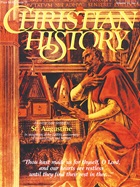From the looks of many modern publications, the ancient “art” of astrology is still very much alive and well—there’s apparently something about the stars that still attracts human attention and superstition as much as it did the young Augustine.
But by the time he was older, his great mind had moved far from trusting in the stars, and had formulated some classic arguments against the validity of planning your life by horoscope.
In his youth, certainly, during his pre-conversion search for truth, he like many others of his age had eagerly consulted astrologers. In the Confessions he relates: “These impostors, whom they designate astrologers, I consulted without hesitation, because they used no sacrifices and invoked the aid of no spirit for their divination.” At that time, he says, he could not have been persuaded to forsake astrology.
Yet later, in both his Confessions and The City of God, he railed against the practice of astrology at great length—and with great insight. In one place, for example, he rhetorically asks: “Why, in the life of twins—in their actions, the events that befall them, their professions, arts, honors and other things pertaining to human life, as well as in their very deaths—is there often so great a difference that, as far as these things are concerned, many entire strangers are more like them than they are like each other, though separated at birth by the smallest interval of time but at conception generated by the same act and at the same moment?”
The mature Augustine had come to believe that human destiny is not shaped by lifeless stars, but by the living Lord of both stars and humanity.
Copyright © 1987 by the author or Christianity Today/Christian History magazine.
Click here for reprint information on Christian History.

Support Our Work
Subscribe to CT for less than $4.25/month




























